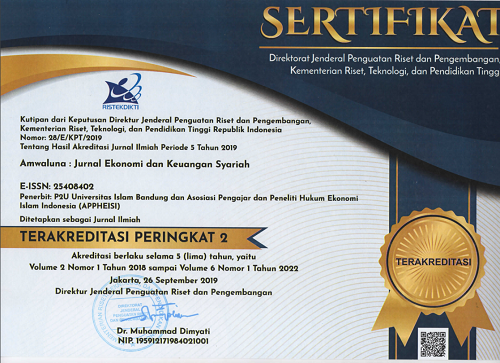THE EFFECT OF KNOWLEDGE AND REGULATION TOWARD THE ISLAMIC FINANCIAL INDUSTRY DEVELOPMENT
Abstract
The development of Islamic finance industry in many countries, it has not been in line with the Moslem population, because beside the potential demand reason, theIslamic financial industry services is also influenced by knowledge and regulation support.This study aims to determine the effect of knowledge and regulation toward the development of the Islamic financial industry. The study uses secondary data from ICD publications in 2013-2019 period for 41 countries. The data were analyzed using the panel data regression and moderating variables, where knowledge has been estimated as a moderating variable for the regulations effect on the Islamic financial industry development. The results showed that: (1) the regulation and the level of knowledge had a positive significant effect to the Islamic finance industry development; and (2) the knowledge variable becomes the moderator between regulation and the development of the Islamic financial industry. This shows that the knowledge would encourage the strengthening of the regulatory effect on the development of Islamic finance.
Keywords
Full Text:
PDFReferences
Al-Jarhi, M.A. (2006). Comparative Banking Systems: The Case For Universal Banking as A Component Of Islamic in Banking Islamic Financial Architecture: Risk Management and Financial Stability Paperback, Khan, T & Muljawan, D. (Editor), 139-208, Islamic Development Bank.
Alam, N. (2013). Impact of banking regulation on risk and efficiency in Islamic banking, Journal of Financial Reporting and Accounting Vol 11(1), 29-50, https://www.emeraldinsight.com/doi/pdfplus/10.1108/JFRA-03-2013-0010.
Alam, N., Zainuddin S.S., and Rizvi S.A.R. (2019) Ramifications of varying banking regulations on performance of Islamic Banks, Borsa Istanbul Review. 19(1), 49-64
Becker, G. S. (1964). Human capital. New York: Columbia University Press
Boediono. (2006). The Role of Islamic Banking In Financial Stability in Banking Islamic Financial Architecture: Risk Management and Financial Stability Paperback, Khan, T & Muljawan, D. (Editor), 37-40. Islamic Development Bank.
Chapra M. U. and T. Khan (2000), Regulation and Supervision of Islamic Banks. Occasional Paper No. 3. Jeddah: Islamic Research and Training Institute: Islamic Development Bank.
Chong, B. S. & Liu, M.H. (2009), Islamic Banking: Interest-free or Interest-based, Pacific-Basin Finance Journal Vol 17(1), 125–144.
Dae-Bong, K. (2009). Human Capital and Its Measurement. The 3rd OECD World Forum on Statistics, Knowledge and Policy. Charting Progress, Building Visions, Improving Life Busan, Korea - 27-30 October 2009.
Fakhfekh, M., Hachicha, N., Jawadi, F., Selmi, N., & Cheffou, A.I. (2016). Measuring volatility persistence for conventional and Islamic banks: an FIEGARCH approach, Emerging Markets Review. 27(2016), 84-99.
Farooq, M. & Ahmed, M.M.M. (2013). Musyarakah Financing: Experience of Pakistani Banks. World Applied Sciences Journal Vol 21(2), 181-189.
Fitz-enz, J. (2009). The ROI of Human Capital: Measuring the Economic Value of Employee Performance. Second Edition. New York: Amacom.
Hariyana, N.B. & Arsyianti, L.D. (2019). Non-Muslim Customer Preferences towards Islamic Banks in Semarang. Al-Muzara’ah, Vol 7(1), 61-74. DOI: 10.29244/jam.7.1.61-74.
Hidayat, Y.R. (2018). Analisis Peluang Dan Tantangan Lembaga Keuangan Syariah Untuk Meningkatkan Daya Saing Menghadapi Masyarakat Ekonomi ASEAN, Amwaluna: Jurnal Ekonomi dan Keuangan Syariah Vol.2(2), 165-181.
ICD-Refinitiv. (2020). Islamic Finance Development Indicator. Available at www.zawya.com/islamic-finance-development-indicator/. (Accessed: 8 February 2020).
ICD-Refinitiv. (2019a). Islamic Finance Development Report Shifting Dynamics. Available at https://www.zawya.com/mena/en/ifg-publications/231019121250Z/ (Accessed: 15 February 2020).
ICD-Refinitiv. (2019b). Islamic Finance Development Indicator Rulebook. Available at https://www.zawya.com /islamic-finance-development indicator/files/IFDI-Rulebook.pdf?v2 (Accessed: 10 February 2020).
Juhari. (2019). Aksiologi Ilmu Pengetahuan (Telaah Tentang Manfaat Ilmu Pengetahuan dalam Konteks Ilmu Dakwah). Al-Idarah: Jurnal Manajemen Dan Administrasi Islam Vol. 3 (1), 95 – 108.
Llewellyn, D. (1999). The Economic Rationale For Financial Regulation. Occasional Paper Series 1. London: The Financial Services Authority.
Lucas, R. (1988). On the Mechanics of Economic Development. Journal of Monetary Economics, Vol. 22(1), 3-42.
Kementrian Agama Republik Indonesia. (2014). Al- Qur’an Tafsir Perkata. Distribution by Al-Hambra: Bandung.
Mulyono (2009). Kedudukan Ilmu Dan Belajar Dalam Islam. Tadrîs. Vol 4 (2), 208-222.
Pasiouras, F., Tanna, S., & Zopounidis, C. (2009). The impact of banking regulations on banks' cost and profit efficiency: Cross-country evidence, International Review of Financial Analysis. 18(5), 294-302.
Pew Research Center. (2011). The Future Global Muslim Population Projections for 2010-2030. Available at http://pewforum.org/ The-Future-of-the-Global- Muslim-Population.aspx, (Accessed: 19 April 2020).
Safieddine, A. (2009). Islamic Financial Institutions and Corporate Governance: New Insight for Agency Theory, Corporate Governance International Review, Vol. 17(2), 142-158
Saunder, A. & Cornett, MM., (2006), Financial Institutions Management: A Risk Management Approach, McGraw Hill, Toronto, International Edition.
Schultz, T. W. (1961). Investment in Human Capital. American Economic Review, Vol. 51, 1-17.
Shinsuke, N. (2010). Reconsidering Mudarabah Contracts in Islamic Finance: What is the Economic Wisdom (Hikmah) of Partnership-based Instruments?, Review of Islamic Economics, Vol. 13(2), 65–79.
Su’un, Possumah, B. T., Appiah, M. K., & Hilmiyah, N. (2018). Determinants of islamic banking adoption across different religious groups in Ghana: A panoptic perspective. Journal of International Studies, 11(4), 138-154. doi:10.14254/20718330.2018/11-4/10
Thomson Reuters. (2019). State of global Islamic economy report 2019. Thomson Reuters, in collaboration with Dinarstandard.
Zubair, A.C. (1997). Filsafat Ilmu Menurut Konsep Islam. Jurnal Filsafat, Vol. 27 (Maret). 38-49.
DOI: https://doi.org/10.29313/amwaluna.v5i2.5950
Refbacks
- There are currently no refbacks.
Editorial Office:
Syariah Faculty, Universitas Islam Bandung
Jalan Tamansari No. 24-26 Kota Bandung

Amwaluna : Jurnal Ekonomi dan Keuangan Syariah is licensed under a Creative Commons Attribution-NonCommercial-ShareAlike 4.0 International License.







